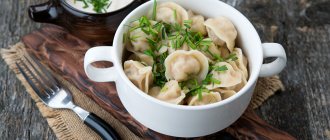How to quickly save a dish if you have over-salted the soup: dilute the broth!
- Add a little boiled (!) water, but no more than 1/3 of the total volume.
- To maintain the richness of a meat dish, it is better to use ready-made unsalted broth. Some experienced housewives even store it in the freezer, using a regular ice tray or other convenient container to always have on hand.
- Simmer over low heat after boiling for 2-3 minutes, then remove from heat.
Important: This method is not suitable for soups with smoked meats or borscht, because In the finished dish, richness of taste, richness and thickness are important. And if you add additional main ingredients, they will cook unevenly, since some of them will already be ready.
As an alternative, or if you have over-salted the soup, you can cook a small portion of the same soup without using salt. And then combine both dishes together. To ensure that the saltiness is evenly distributed, boil the stew for about 2 minutes.
Over-salted borscht and other first courses
Housewives often make the mistake of adding spices when preparing first courses. So it’s worth finding out what to do if you oversalt your soup or borscht.
The situation can be improved by doing the following:
- It is necessary to pour the broth into a clean container and place it on the stove.
- You need to thoroughly rinse the raw rice and roll it in cheesecloth.
- In this form, the rice is sent into boiling broth. It must remain there until it is completely ready.
- Upon completion of the procedure, all that remains is to remove the gauze.
Potatoes are used in a similar way, which must be boiled in over-salted broth from borscht or soup.
Proven ways to save over-salted soup: use products that absorb salt
- Method number 1 - add potatoes
If you have soup without potatoes, it is enough to cut 2-3 tubers to reduce the saltiness of the dish. But if there are already potatoes in the soup, immerse the whole potato for 7-10 minutes (if it is very salty, then 2-3). Afterwards, remove the tuber.
Tip: A bow works the same way. Place the cleaned head in the broth, boil a little and remove from the soup.
Repeatedly proven method
- Method No. 2 - pasta, rice or other cereals will come to the rescue
If you have oversalted the soup, it is convenient to use a bag of rice. The cereal will absorb excess salt. And after that you will have not only the first dish, but also a side dish.
If you have cereal in bulk, then wrap it in two layers of gauze and tie the edges tightly. Boil the soup for 5 minutes and remove the knot. Depending on the degree of salinity, you may need from 2 to 5-7 tbsp. l.
We do the same with pasta, or add it directly to the dish if the soup is not very thick.
- Method number 3 - use a raw egg
Beat the egg a little with a fork and pour into the soup in a thin stream, stirring constantly. This is an excellent solution not only for meat, but also for fish soup. If you don't like soups with eggs, then break it into a fine sieve and immediately immerse it in boiling water for a few minutes.
- Method No. 4 – flour to thicken and reduce salinity
Wrap 2-3 tablespoons of flour in a thick cloth and leave for 5 minutes. For thick dishes or puree soup, you can mix 2 tbsp. l. flour with a small amount of broth, and then pour into the boiling soup in a thin stream, stirring continuously. This will allow the flour to absorb excess salt and add thickness.
Important: Be very careful that no lumps form!
- Method No. 5 - submerge the rye bread crumb
In the same way, wrap a small piece of black bread pulp in a thick cloth, dip it in boiling soup for a few minutes, and then dispose of it. Do not use cheesecloth, otherwise the crumb will seep into the broth and spoil its taste.
For reliability, take cotton fabric
Second way
You can mix the salt with sugar - one spoon per pan of broth will be enough. The pleasant sweetish taste is especially good in pea soup and cabbage soup. But this method is suitable only if the oversalting is insignificant.
If you have lump sugar, you can put it in a ladle and lower it into the broth. As soon as the sugar begins to dissolve, it is quickly removed. This procedure is repeated several times until the salt returns to normal. The method is complex, but effective, since sugar absorbs salt well.
What spices and seasonings should I use if I over-salt the soup?
- Add 1-2 tsp. sugar (8-10 g). Add in portions, tasting the soup each time so as not to completely spoil it. You can use brown or refined sugar, but spoon it in and out without waiting for it to completely dissolve. For a piquant taste, you can add honey.
- The acid will reduce the saltiness slightly. You can use lemon juice (1-2 tsp), citric acid (2-3 g), 0.5 tbsp. l. apple cider vinegar or a spoonful of dry white wine. Dessert wines provide sweetness, so they can be used if the soup is too salty, but with caution! Add spices gradually, tasting each time.
Important: We acidify pickles and solyankas carefully, since they contain acidic ingredients.
- Tomato paste will save the situation! But it is important to take a paste or juice, and not a seasoning with spices. 1-2 tbsp is enough. l. However, take into account the compatibility of products. This is an excellent option for buckwheat or bean soup, as well as pickle and cabbage soup.
- Milk, sour cream or cream will take away some of the salt. This is an option for milk and mushroom soups, as well as cream soup. Yogurt is also suitable for the last dish.
- Add more fresh herbs! It is never superfluous in the soup and neutralizes slight saltiness. Any greens you like are suitable. Dry seasoning is allowed, but without additional spices.
Milk, instead of plain water, will absorb excess salt
Cheat sheet by type of dish: borscht, pea soup or green cabbage soup?
You've probably noticed that these methods are not suitable for every type of soup. To avoid confusion, use this simple reminder:
- vermicelli soup can be corrected by adding a bag of rice or flour for 10 minutes or grating a fresh potato;
- Season borscht and cabbage soup, tomato soups or solyanka with a small amount of lemon juice or apple cider vinegar;
- It’s ideal to throw a handful of rice into a pickle pan or green cabbage soup and pour in a raw egg;
- tomato paste and sour cream will help you out if you have over-salted any “red” soup;
- lemon will ideally complement the taste of fish soup and solyanka;
- cream perfectly complements the taste of puree soups, correcting over-salting;
- For bean, chicken, mushroom and pea soups, a raw egg is suitable.
You can use several additives at once to mask oversalting.
What to do if you over-salt your soup: tips
- Add sour cream or cream when serving, this will neutralize the slight saltiness of the soup.
- Fry croutons (preferably rye bread), without salt. For pea soup, garlic croutons are an excellent option - just fry 3-4 cloves of garlic with croutons, passing them through a press.
- If you over-salted a light vegetable soup, then make dumplings or dumplings! To do this, beat 2 eggs with 3 tbsp. l. milk (possibly with water) and knead a not very tight dough. Don't use salt! Drop the dumplings into the water with a spoon and cook for about 3 minutes.
And to understand what the difference is between them, we suggest reading the article “What is the difference between dumplings and dumplings?”
- work on the same principle , but make them without salt.
- If the soup is thin, add boiled beans. Then simmer together for about 4 minutes.
Important: When cooking beans, do not use salt, otherwise the cooking time will increase significantly. The spice is added at the very end, but we don’t need it.
- When serving, you can put half or a quarter of a boiled egg on a plate, sprinkling chopped herbs on top. This option is suitable for soups that are not too salty.
- The slight saltiness will also be removed by butter if you put a small piece of it directly on the plate.
As you can see, even over-salted soup can be saved! But never forget that you need to salt and season dishes when you already have all the ingredients. And remember the golden rule - “it’s better to under-salt on the table than over-salt on the back”! And everyone can add salt themselves, adjusting it to their taste.
How to salt broth correctly
Everyone knows that a situation is easier to prevent than to correct. Therefore, finally, some tips on how to properly salt soup.
- Over-salting most often happens due to inattention, when the housewife simply forgets that she has already salted the broth once and salts it a second, or even a third time. To avoid this, be sure to taste the broth before adding salt. Alas, there is no visual way to determine salinity, so don’t be lazy to taste before adding salt.
- After the broth is salted, let it cook for a few minutes, and then just taste. This time is needed to allow the salt to disperse. If you taste the broth immediately after adding salt, the soup will seem unsalted.
- You should taste the broth for salt not from the top, but from the middle of the pan. There is usually a layer of fat on top, and it hardly absorbs salt, so it’s easy to make a mistake and oversalt.
- A slightly cooled soup is always somewhat saltier than a hot one - this must be taken into account when serving the first course. It’s better not to add a little salt at all, and then the not very hot soup will seem moderately salty.
Date: 09/16/2015.
Updated: 08/02/2019
Photo: pixabay.com
How to save dishes from excess salt
There are methods that will help you cope with the problem using products.
What to do if you oversalt your meat or fish?
Over-salting meat is a complex problem that requires some sacrifices: the taste of the dish will most likely suffer, but you will still be able to save it from the trash. The meat must be removed and washed in cold water. After this, it is kept on fire for some time.
Grilled, lightly salted fish can be treated with the addition of lemon juice.
What to do if you over-salt your mashed potatoes?
In this case, adding some unsalted mashed potatoes helps. If this option is not suitable, then you can use butter. Many people like potatoes with the addition of butter, which adds tenderness, mutes the salty taste and makes the mashed potatoes thicker.
How to fix rice?
The most suitable method in this case is to rinse with plenty of cool water. The lower the water temperature, the better the end result. Washed rice will become more attractive and will get rid of excess salt.
Correcting over-salted porridge, buckwheat and other cereals
If the porridge was prepared with milk, then you can get rid of the oversalting by adding a small amount more. Otherwise, it is better to use peeled raw potatoes, which will absorb excess salt.
Adviсe
- Borscht can be prepared from almost any meat, fish, and even without any meat component at all. However, the most delicious is beef soup. In this case, it is best to use marrow bone or brisket.
- To make the borscht have a brighter color and more pronounced taste during frying, add: a little sugar, citric acid or juice, apple, table or wine vinegar.
- It is better not to cut the garlic, but to grate it in a mortar with salt and herbs. The mixture is added at the end of cooking - this will make the borscht very flavorful.
- Ready borscht should sit for at least 30 minutes. During this time, all ingredients will be saturated with each other’s aromas.
- It is best to serve borscht with sour cream, fresh herbs and donuts.
Products that will remove salt from broth
Some products that we always have on hand can reduce the level of salt in soup and improve its taste:
They can be used for different types of soups.
One of the most common adsorbent products that can absorb excess salt is raw rice. You can simply add a small amount of it to over-salted vegetable, mushroom or fish soup. Just remember that the rice takes about 10 minutes to cook. Add it during the cooking process, or you will have to deal with overcooked grains .
Rice absorbs excess salt well when cooked.
Rice in the soup goes well with millet and pearl barley.
For soup with noodles, borscht or cabbage soup, adding rice is not applicable. And what to do in such a situation? Yes, very simple. Cooking rice in a bag will help you. Just put it in a pot of soup for 5-10 minutes and the grains will absorb the excess salt.
Choosing a method for saving soup depending on the prepared broth
How to save over-salted soup? Pea, noodle soup, solyanka, borscht or cabbage soup can be revived in different ways.
- You can drive a couple of raw eggs into sorrel cabbage soup and pickle soup and boil them for a couple of minutes.
- Add a little vermicelli and water to vermicelli soup.
- If adding acid is acceptable, for example, if you are cooking borscht or vegetable soup, you need to add a little lemon juice.
- If you are making red soup, add a little tomato juice or a spoonful of tomato paste.
- It turns out very tasty if you add a little cream to salted pea or pumpkin soup.
Several methods can be used simultaneously. For example, beat an egg, add cow's butter and add a handful of vermicelli.
How to fix fish broth? To make the first one rich, they put a lot of bones and a head in it. Such products instantly absorb a lot of salt. But if salt is added in excess, then first of all add a little pearl barley to the over-salted fish soup.
Fish broth and adding a whole onion will also help. When the soup is ready, remove the onion. Adding raw eggs will help make fish broth much tastier and rid it of excess salt.











